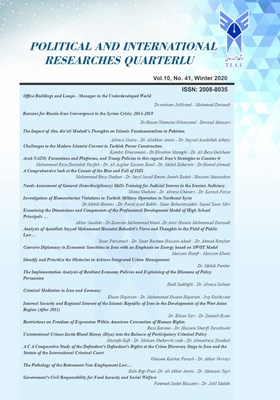Arab NATO; Formations and Platforms, and Trump Policies in this regard: Iran's Strategies to Counter it
Subject Areas : Political and International Researches Quarterly
Keywords: strategy, Iran, Israel, US, Arab NATO,
Abstract :
Mohammad Reza Davtalab Vazifeh[1] Ali Asghar Kazemi Zand[2] Mehdi Zakerian[3], Hamid Ahmadi[4], Abstract With the coming to power of Donald Trump in the United States, he takes a different approach to the level of extremist action on various global and regional issues, which has created security threats for various actors. This new attitude has also influenced Iran as the main focus of developments in the Middle East. Trump administration pursues step-by-step confrontation with Iran on security issues in the Middle East. The plan to create an Arab NATO is also at the heart of Trump's Middle East policy and forms the purpose of this article. In this regard, the main question in this article is, "What are the goals of the Trump administration in the Middle East and what obstacles will it face?" In response to this fundamental question, the paper's hypothesis is formulated that “the goal of forming an Arab NATO appears to be to limit Iran's regional influence and to create an Arab-Islamic bloc with the presence of Israel and even the United States." The findings show that the main obstacles to the Arab NATO plan are the Qatar crisis and the internal divisions of the Arab countries over regional issues, the weakening of Saudi Arabia's position in the West, the differences in regional readings of terrorism, and the divide in the Arab world over how to confront it. Iran and the intensification of Shiite-Sunni religious conflicts and divisions in the Middle East. [1] PhD student, International Relations, Faculty of Law, Theology and Political Science, Islamic Azad University, Tehran, Iran [2] Professor and Faculty Member, Department of International Relations, Faculty of Law, Theology and Political Science, Science and Research Branch, Islamic Azad University, Tehran, Iran (Corresponding Author) [3] Associate Professor and Member of the Department of International Relations, Faculty of Law, Theology and Political Science, Islamic Azad University, Tehran, Iran. [4] Professor and Faculty Member, Faculty of Law and Political Science, University of Tehran, Tehran, Iran
_||_

